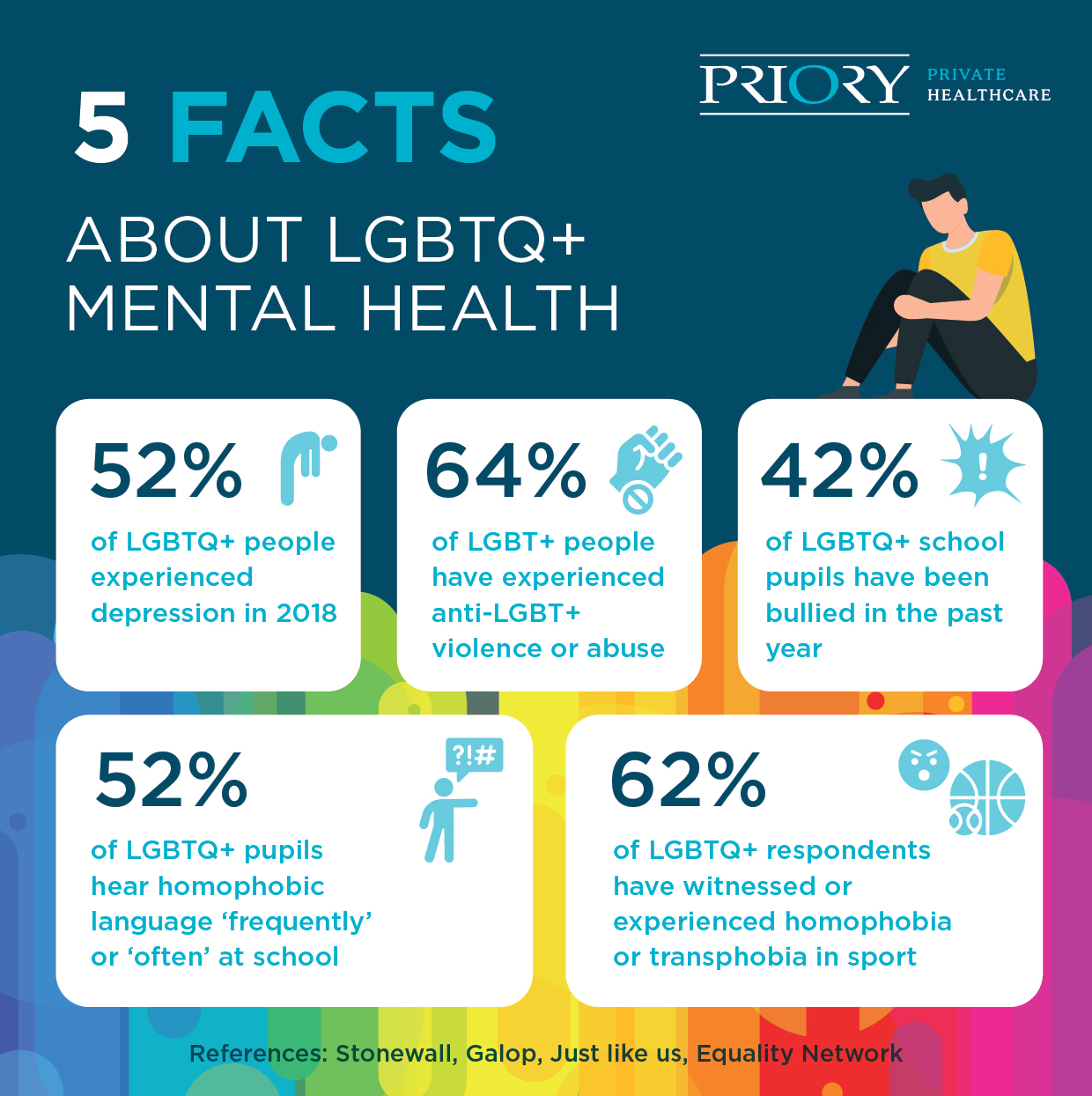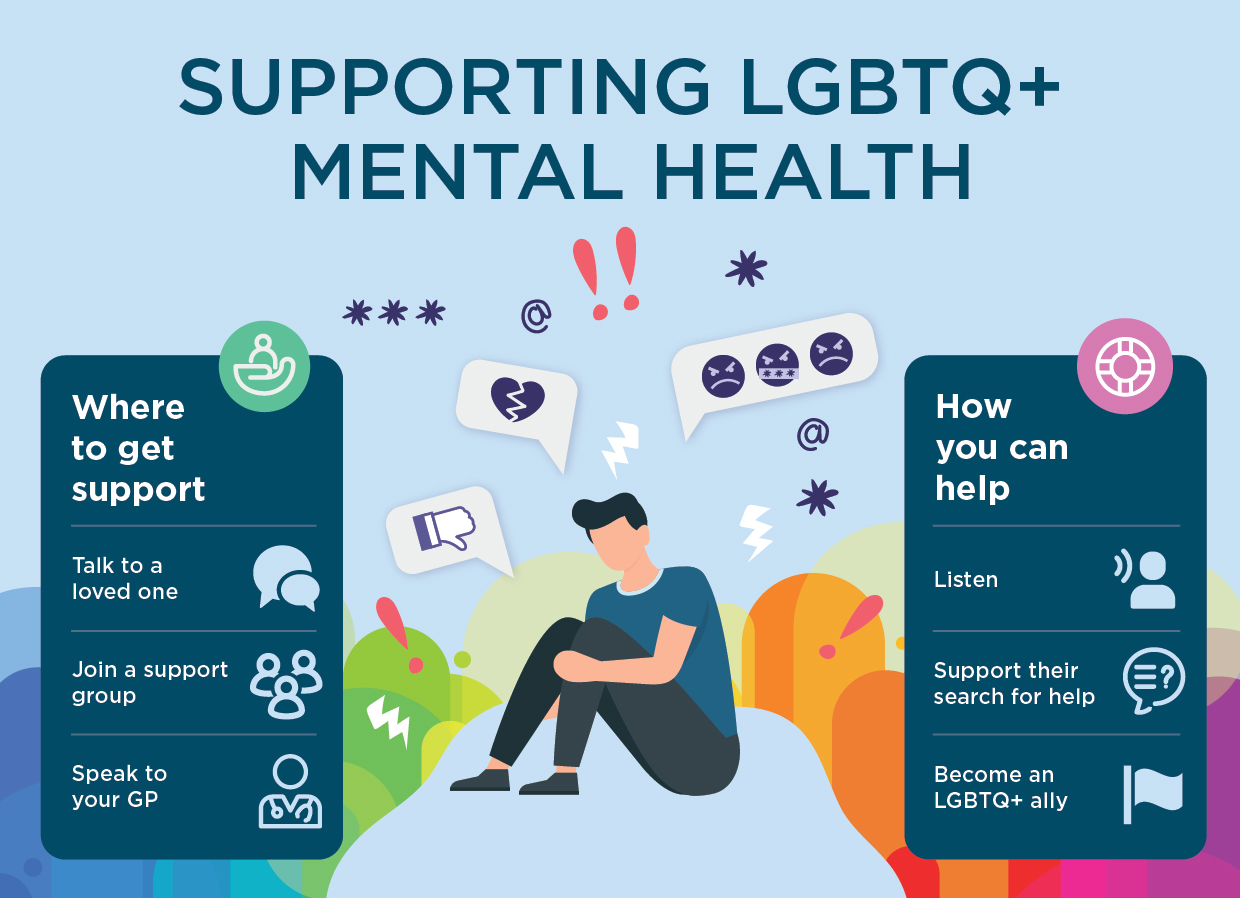LGBTQ+ mental health: stats, support and how to help
Why the lesbian, gay, bisexual, transgender and queer (LGBTQ+) community may be at risk of mental health difficulties, and where you can get the support you need.
LGBTQ+ stands for lesbian, gay, bisexual, transgender/trans, queer/questioning and 'plus'. The plus represents other sexual identities, such as pansexual or asexual. If you would like more information on the correct terms and definitions, Stonewall, a leading charity on LGBTQ+ rights, has an extensive glossary.
LGBTQ+ is the accepted societal method for referring to the queer (which is another acceptable term) community. It's used to reflect and represent a diverse range of sexualities and identities.
Anyone can experience problems with their mental health, but extensive evidence suggests that people in the LGBTQ+ community may be more likely to struggle with issues such as depression, anxiety and eating disorders. This article, written for both LGBTQ+ people with mental health issues, or people who know someone from that community who is experiencing difficulties, discusses:
Research on the LGBTQ+ community and mental health show that people in this community might be at an increased risk of experiencing difficulties. Statistics show:
Being in the LGBTQ+ community doesn't cause mental health problems. The reasons someone develops mental health issues are often complicated and multi-faceted. However, certain things are unique to people within this community, which may play a role in LGBTQ+ people developing a problem with their mental health.

Negative attitudes towards people in the LGBTQ+ community still exist in society today. In the 2018 national LGBT survey, 40% of people in the LGBTQ+ community said they’d experienced a negative incident, related to their sexuality or identity, in the last 12 months. The most common type of incident was verbal abuse.
Abuse of any kind can be can be very damaging to someone’s mental health. For many people who suffer multiple incidents, it can quickly feel like it's just part of their experience as a member of the LGBTQ+ community.
Coming out to your friends and family is often a very stressful experience, especially if you think it might be taken negatively by people close to you, or might lead to severe consequences. As an example, research from the Albert Kennedy Trust found that 69% of young LGBTQ+ homeless people were rejected by their family and suffered abuse.
It takes real strength to come out as an LGBTQ+ person. People who are crippled by the stress of hiding their true self, or suffering from abuse after coming out, are at risk of mental health complications. It’s completely normal to find it difficult coming out, and many people do struggle with it. If you need advice, the LGBT foundation is a good place to start.
Society is making steady progress towards treating everyone equally and fairly, but it’s still the case that someone in the LGBTQ+ community may be treated differently in a variety of settings, just for being who they are.
This might happen in schools, religious groups, or when using certain services. One of the most distressing places that discrimination can happen is in the workplace. A study from the Chartered Institute of Personnel and Development found that 40% of LGBTQ+ workers have experienced a work-based conflict in the last year, rising to 55% among trans workers. The figure for heterosexual workers was 29%.
It’s important to know your rights. The Equality Act 2010 was introduced in order to protect people from discrimination in the workplace and wider society. The government’s guidance can offer you direction if you think you’ve been the victim of discrimination based on your status as a member of the LGBTQ+ community.
Discrimination, abuse and negative attitudes can result in members of the LGBTQ+ community not feeling as though they’re respected by wider society. The national LGBT survey showed how this manifests itself in the LGBTQ+ community, as they amend their behaviours to hide who they really are or avoid confrontation.
Without acceptance, you can begin to feel very isolated and cut off from society. Loneliness and isolation, combined with stress from discrimination, abuse and conflict with family members, can easily combine and cause a mental health condition like depression, anxiety or an eating disorder.
Growing up as an LGBTQ+ person can be incredibly challenging. Bullying is a key driver of poor mental health among LGBTQ+ students in secondary school or college, and support levels remain low – as Stonewall’s school report found.
However, Stonewall acknowledged in their report that, over the course of 10 years, the number of lesbian, gay and bisexual pupils who were bullied because of their sexual orientation had fallen by almost a third. Plus, as of 2021, LGBTQ+ inclusive lessons became mandatory in all schools across England – showing that change is happening across education.
If you’re struggling with your mental health, it’s important to know you're not alone. Help and support are available in many different forms if you need it.

It takes incredible bravery to admit that you’re not OK, but it can be an immense relief to just get it off your chest. Speak to someone you trust, whether this is a friend or loved one – they’ll be able to listen to you and support you with what you're going through.
There are plenty of peer support groups, where you can meet and speak to likeminded people. Take a look on Stonewall’s LGBT support page, where you can search for local community groups. If you want to stick to online support, Mind’s Side by Side community is a great place to head to.
Your doctor can be a great person to speak to if you want a medical perspective on your struggles. They could diagnose any mental health issues you're struggling with, outline treatment options, or refer you to specialist LGBTQ+ mental health services that might be available to you.
If you’re in need of support from outside your immediate family, there are charities and other organisations that can offer specialist support for LGBTQ+ people. LGBTQ+ mental health charities such as MindOut and LGBT HERO are a good place to start.
If you’re open to mental health support that doesn’t just specialise in serving the LGBTQ+ community, the likes of SANE and Samaritans have 24/7 helplines for anyone who's struggling and in need of someone to talk to, or crisis support.
Talking therapy is an effective treatment for many mental health conditions, making recovery absolutely possible. In therapy, you’ll speak to a trained professional about your feelings and develop more positive thought processes. Many therapists have experience working with LGBTQ+ people, and you can speak to someone whose skills and experience are tailored to your needs.
Speak to your GP about whether therapy is right for you, or alternatively, reach out to a private provider like Priory. Our world class team of highly qualified mental health specialists are here to help.
Aside from external support, there are some small lifestyle changes you could make that might improve your mood and reduce any symptoms you’re experiencing – but only do what you feel like you can.
If you know someone who's having trouble with their mental health, there’s plenty you can do to be a supportive friend, family member or loved one. Here are some simple yet effective things we can all do to support LGBTQ+ people through their mental health challenges.
Sitting down to talk to your friend or loved one might seem small, but it can be incredibly powerful. If you suspect someone isn’t OK, it can be useful to reach out to them in a careful and compassionate way – they might be afraid to speak up and initiate the conversation.
When you're having those initial conversions, you only need to do one thing – listen. Don’t make assumptions based on what you think you know about mental health or people in the LGBTQ+ community. Enter the conversation with an open mind and try and put yourself in their shoes. Only then will you really get someone to open up about their feelings.
Accepting that they need help is a huge step for your friend or loved one, and they’re going to need support throughout that process. Whether it’s attending a GP appointment with them or driving them to a therapy session, just being present lets your loved one know you're there for them.
Knowing how to approach these issues can be tough, especially if you’ve never experienced them yourself. Make sure you’re as clued up as possible, reading up on all things mental health and the challenges that LGBTQ+ people face that can damage their wellbeing.
If you’re doing everything above and just generally doing all you can to show your support for the community, then you can consider yourself an LGBTQ+ ally. The more people in society who treat everyone equally and without prejudice, the more effective we’ll all become at tackling mental health inequalities in the LGBTQ+ community.
Here are some further suggestions for supporting people with specific mental health issues: